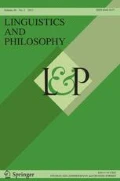Abstract
In the classic Linguistic Communication and Speech Acts,Kent Bach and Robert M. Harnish advocated the idea that to perform an illocutionary actoften just means to express certain attitudes. The underlying definition of attitudeexpression, however, gives rise to serious problems because it requires intentions of a peculiarkind. Recently, Wayne Davis has proposed a different analysis of attitude expression whichis not subject to these difficulties and thus promises a more plausible account of illocutions.It will be shown, however, that this account is too weak since it does not exclude cases wherethe utterer merely pretends to perform an illocutionary act. Davis' analysis also callsinto question a weaker doctrine widely held among speech act theorists by suggesting that, inorder to perform an illocutionary act, it is not even necessary to express mental states.
Similar content being viewed by others
REFERENCES
Alston, W. P.: 1991, ‘Searle on Illocutionary Acts’, in E. Lepore and R. van Gulick (eds.), Searle and His Critics, Cambridge, MA, pp. 57–80.
Alston, W. P.: 2000, Illocutionary Acts &; Sentence Meaning, Ithaca and London.
Austin, J. L.: 1962, How to Do Things with Words, Oxford.
Bach, K.: 1981, ‘Escaping the Speech Act Dilemma’, Analysis 41, 146–149.
Bach, K.: 1987, ‘On Communicative Intentions: A Reply to Recanati’, Mind &; Language 2, 141–154.
Bach, K. and Harnish, R. M.: 1979, Linguistic Communication and Speech Acts, Cambridge, MA.
Carr, C. R.: 1978, ‘Speaker Meaning and Illocutionary Acts’, Philosophical Studies 34, 281–291.
Davis, W. A.: 1988, ‘Expression of Emotion’, American Philosophical Quarterly 25, 279–291.
Davis, W. A.: 1992a, ‘Cogitative and Cognitive Speaker Meaning’, Philosophical Studies 67, 71–88.
Davis, W. A.: 1992b, ‘Speaker Meaning’, Lingustics and Philosophy 15, 223–253.
Davis, W. A.: 2002, Meaning, Expression, and Thought, Cambridge University Press, to appear.
Grice, H. P.: 1957, ‘Meaning’, in H. P. Grice, Studies in the Way of Words, Cambridge, MA, 1989, pp. 213–223; orig. publ. in The Philosophical Review 66, 377–388.
Grice, H. P.: 1968, ‘Utterer's Meaning, Sentence-Meaning, and Word-Meaning’, in H. P. Grice, Studies in the Way of Words, Cambridge, MA, 1989, pp. 117–137; orig. publ. in Foundations of Language 4, 1–18.
Grice, H. P. 1969: ‘Utterer's Meaning and Intentions’, in H. P. Grice, Studies in the Way of Words, Cambridge, MA, 1989, pp. 86–116; orig. publ. in The Philosophical Review 78, 147–177.
Kemmerling, A.: 2002a, ‘Expressing an Intentional State’, in G. Grewendorf and G. Meggle (eds.), Speech Acts, Mind and Social Reality. Discussions with John R. Searle, Studies in Linguistics and Philosophy, Dordrecht, to appear.
Kemmerling, A. 2002b: ‘Gricy Actions’, in G. Cosenza (ed.), Paul Grice's Heritage, pp. 69–95.
Recanati, F.: 1986: ‘On Defining Communicative Intentions’, Mind &; Language 1, 213–242.
Recanati, F.: 1987, Meaning and Force, Cambridge.
Schiffer, S.: 1972, Meaning, Oxford.
Searle, J. R.: 1969, Speech Acts, Cambridge.
Searle, J. R.: 1975, ‘A Taxonomy of Illocutionary Acts’, in J. R. Searle, Expression and Meaning, Cambridge, 1979, pp. 1–29; orig. publ. in K. Gunderson (ed.), Minnesota Studies in the Philosophy of Science 9: Language, Mind and Knowledge, Minneapolis, pp. 344–369.
Siebel, M.: 2001, ‘Searle's Representing Account of Illocutionary Acts and its Weak Spots’, in L. Lundsten, A. Siitonen and B. Österman (eds.), Communication and Intelligibility, Acta Philosophica Fennica 69, Helsinki, pp. 97–111.
Siebel, M.: 2002a: ‘Was sind illocutionäre Akte?’, in M. Siebel (ed.), Kommunikatives Verstehen, Leipziger Schriften zur Philosophie 16, Leipzig, pp. 138–164.
Siebel, M.: 2002b, ‘What is an Illocutionary Point?’, in G. Grewendorf and G. Meggle (eds.), Speech Acts, Mind and Social Reality. Discussions with John R. Searle, Studies in Linguistics and Philosophy, Dordrecht, to appear.
Vanderveken, D.: 1985, ‘What is an Illocutionary Force?’, in M. Dascal (ed.), Dialogue and Interdisciplinary Study, Amsterdam, pp. 181–204.
Vanderveken, D.: 1990, Meaning and Speech Acts I: Principles of Language Use, Cambridge.
Author information
Authors and Affiliations
Rights and permissions
About this article
Cite this article
Siebel, M. Illocutionary Acts and Attitude Expression. Linguistics and Philosophy 26, 351–366 (2003). https://doi.org/10.1023/A:1024110814662
Issue Date:
DOI: https://doi.org/10.1023/A:1024110814662


